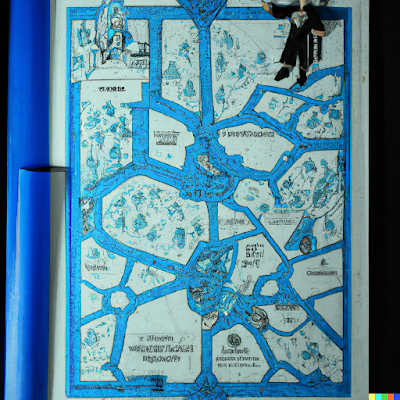Modern D&D has a well-publicized problem with orcs, drow, and various other conventionally “dark” or traditionally “evil” humanoids. The standard response to this problem has been to modify the lore or change the perspective to present these creatures in a better light, or at least remove the details that raise troublesome questions about historical or current treatment of real-world groups of humans.
I don’t think this is a bad approach, if the system supports it. The RPG Spire inverts and interrogates the traditional portrayal of the drow, positioning them as an oppressed underclass fighting the imperious high elves. I can’t personally vouch for it (I own the book, but haven’t yet run it), but it was well-reviewed, generally and on this criteria in particular.
I’m less convinced by the efforts of D&D 5E and its cousins to recontextualize the baggage of their “dark” ancestries. Their solutions seem to struggle with creating coherent identities for different sapient creatures, because there isn’t a consistent worldbuilding premise underpinning those relationships. And they’ve continued to catch heat for subsequent content they’ve released, well after acknowledging the problem.
D&D is built on a complex foundation of influences stretching far back into the pulp fiction of Appendix N, and the game has dabbled in many different styles across various settings. So it’s probably not realistic for D&D to do a script-flipping reset of the core premise in the manner that Spire could (because Spire was created as an independent, original game, but at the same time could benefit from being in dialogue with D&D itself).
But there is an alternate path for D&D to resolve these issues more elegantly. Instead of wading into the messy and imprecise process of trying to give every humanoid the same thoughtful and fair treatment one would give a real-life group of humans, the game could pivot in the other direction. Categorically reject the idea that orcs, dark elves, or the other creatures in question are at all comparable to real world ethnic groups or human cultures. What would this look like? There are examples within D&D already.
Consider undead or lycanthropes. I won’t say that these creature types have never caught flak for allegedly negative portrayals of real-world issues. I’m sure there are instances where they have. But generally, zombies and werewolves cause far less friction than orcs and drow, because we recognize them as mockeries or distortions of humanity. They are humans altered by outside forces, rather than exogenous fellow sapients.
All of that is to say we can treat D&D fantasy humanoids as subversions, perversions, or dark reflections of humanity. How? Play up the idea that the dungeon, as mythic underworld, changes people. It changes them into something else.
Next Week: The Descent of Man





No comments:
Post a Comment